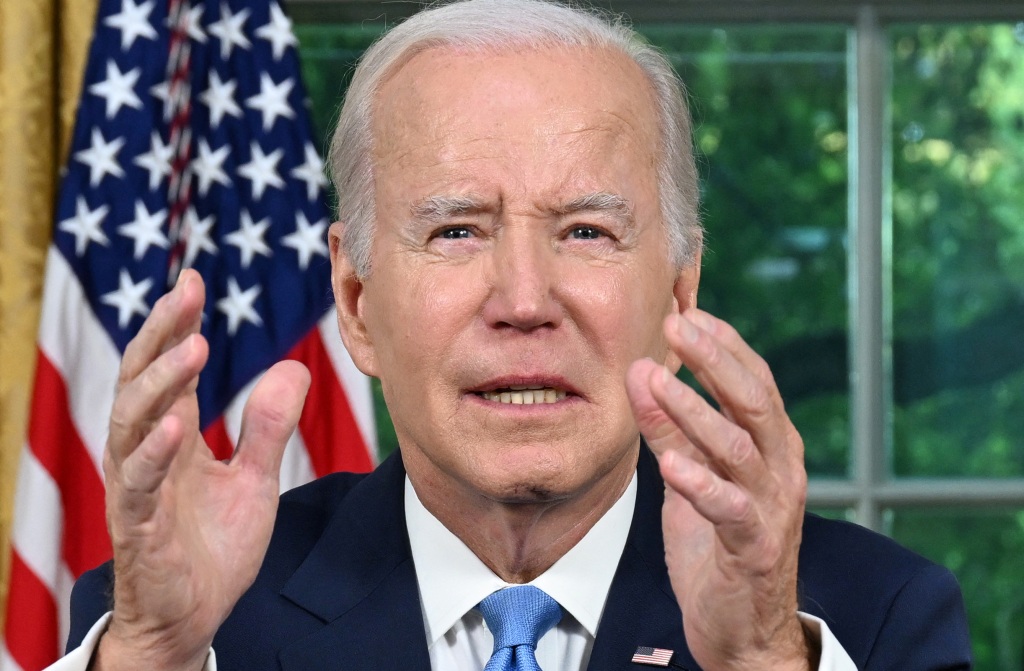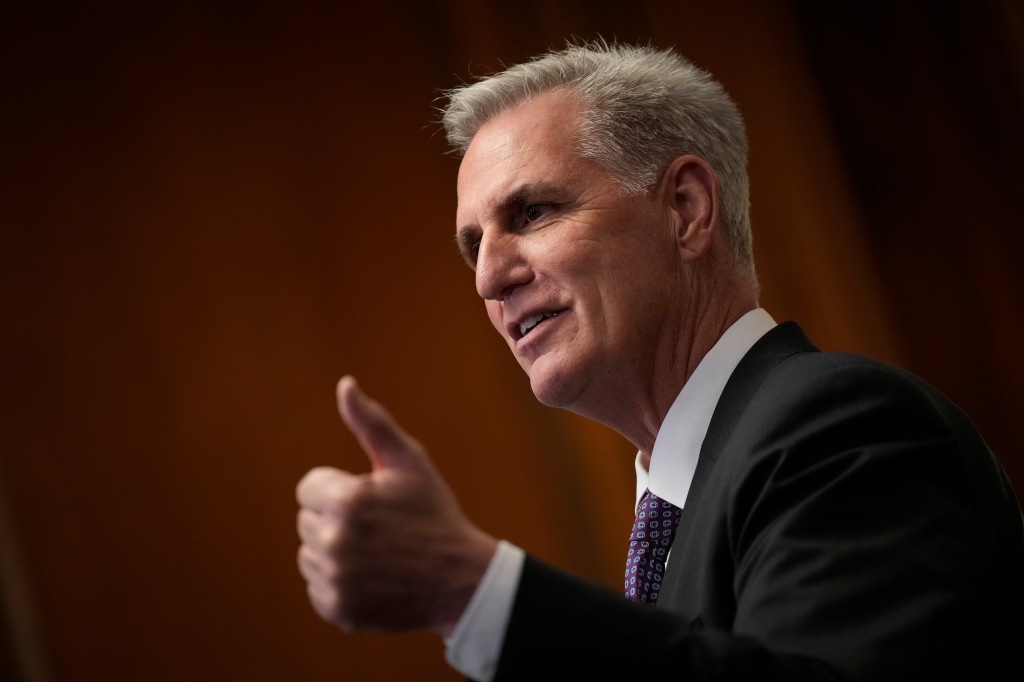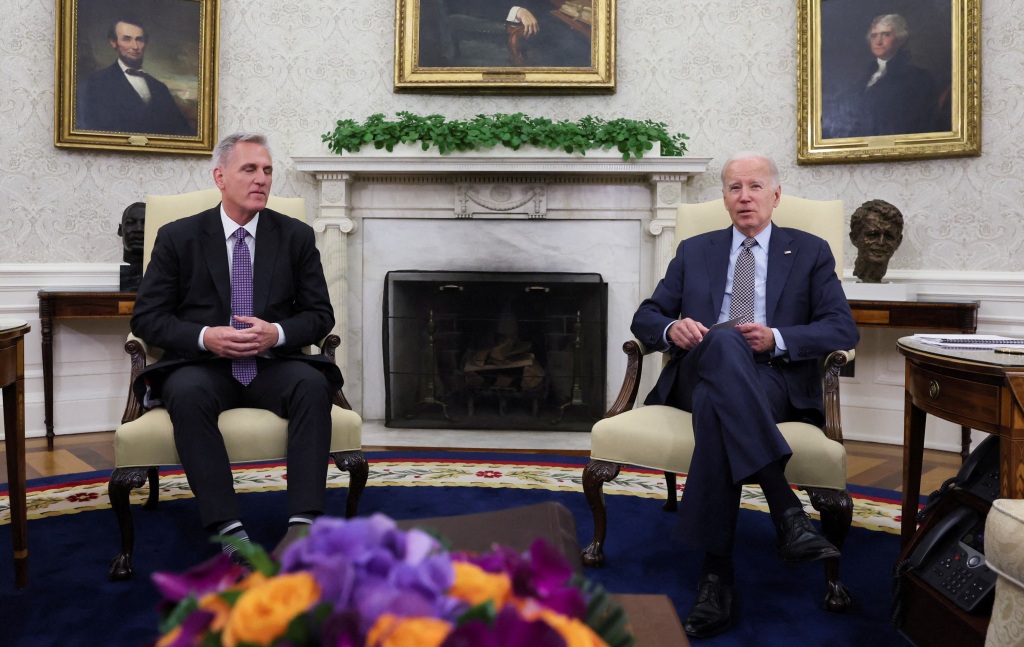Biden says US dodged ‘economic collapse’ in first Oval Office speech since deal reached to raise debt ceiling
WASHINGTON — President Biden used his first Oval Office address to the nation Friday evening to celebrate the passage of legislation raising the federal debt ceiling until January 2025 — telling Americans the country had narrowly avoided “economic collapse.”
“It was critical to reach an agreement and it’s very good news for the American people,” said Biden, announcing that he would sign the bill Saturday ahead of a Monday deadline to avoid a possible federal default.
“No one got everything they wanted. But the American people got what they needed,” the president added during his 13-minute-long remarks from behind the Resolute Desk.
“We averted an economic crisis, an economic collapse. We’re cutting spending and bringing the deficits down at the same time.”
Biden, 80, used the rare venue after the Senate on Thursday night voted 63-36 to approve the House-passed bipartisan compromise that restrained the growth of future spending while tweaking rules to social-welfare programs and new revenue for IRS enforcement.
“My fellow Americans, when I ran for president, I was told the days of bipartisanship were over and that Democrats and Republicans could no longer work together. But I refuse to believe that,” Biden began his remarks.
“America can never give into that way of thinking. Look, the only way American democracy can function is to compromise and consensus. And that’s what I work to do as your president, to forge bipartisan agreement where it’s possible and where it’s needed.”
Biden added that he was addressing the nation “to report on a crisis averted … The stakes could not have been higher.”
“I want to commend senator — Speaker [Kevin] McCarthy, you know, he and I, we and our teams, we were able to get along and get things done,” The president said later in his statement. “We were straightforward with one another, completely honest with one another and respectful with one another. Both sides operating in good faith. Both sides kept their word.”

The nation’s oldest-ever president, who drew negative coverage Thursday by falling on stage at the Air Force Academy’s graduation and then hitting his head on the doorframe of the Marine One helicopter when he returned to the White House, also used the venue to tout the survival of many of his key legislative feats through the bargain, including the 2021 bipartisan infrastructure law, an environmental spending package and a bill that funds expanded veteran health care.
He also cast himself as a voice for fiscal restraint, despite massive spending during his first two years in office that even Democratic economists blamed for unleashing the worst inflation since the early 1980s.
“Nearly $8 trillion was added to the national debt in the last administration and now we’re turning things around. And that’s good for America,” Biden said, adding that he would seek more “revenue” — including higher taxes on billionaires and corporations and tougher enforcement on what he called “wealthy tax cheats.”
“I’m going to come back, and with your help, I’m gonna win,” Biden said of Democratic tax proposals.

The speech happened at an unusual time for viewership — after the stock market closed for the week and as workers across the nation tuned out the news and headed home to enjoy the start of their weekend.
“It’s not just the number of people who watch the address, it is how the address is then portrayed on television and in newspapers — they’ll be able to see it on the 11 o’clock news and in their newspaper,” said political scientist Martha Kumar, author of “Managing the President’s Message.“
“People associate Oval Office addresses with important presidential statements, and I think he respects the history of the presidency and sees this as a moment to stop and consider the importance of the event.”
Notable recent Oval Office speeches have been delivered by Ronald Reagan after the space shuttle Challenger disaster, George W. Bush after the Sept. 11 attacks and announcing the invasion of Iraq, and Donald Trump at the onset of the COVID-19 pandemic.
“Giving his address from the Oval Office signals the importance that he places on what they have accomplished and the bullets that they dodged,” Kumar said.
“The emphasis all along has been the need to do it, but now that it has been agreed to, it’s a reminder that we came far closer than we should have to a dire situation.”
House Speaker Kevin McCarthy (R-Calif.) regularly briefed reporters on negotiations with the White House throughout the process, irking some Democrats in Congress.
Kumar said that the speaker’s messaging served his need to keep Republicans engaged, while Biden’s lower-profile public approach reflected his legislating style dating to his Senate tenure.
Kumar also said that Biden’s victory lap reflects his administration’s feeling that the Obama administration, in which Biden and many current White House staffers served, did not get enough credit for navigating the country through the Great Recession after the 2008 financial crisis.

The Republican-held House passed the debt-ceiling legislation 314-117 on Wednesday, losing support from many conservative and far-left members, but drawing moderates and others who agreed to postpone budget fights for later bills.
The broad margin followed condemnation from some fiscal hawks who said more should have been done to cut spending and from leftists who objected to changes in food stamp rules requiring 50 to 54-year-olds to work or train at least 20 hours per week.
The food stamps work requirement already applies to childless adults aged 18 to 49.
The change was offset by relaxed requirements for veterans, the homeless and recent foster children.
The legislation will constrain annual non-defense discretionary spending increases to 1% per year.
GOP critics said they were outraged that there wasn’t a cut, though conservative defenders of the deal say that the increases would be less than inflation, resulting in de facto cuts.
Read the full article Here


